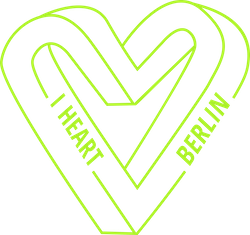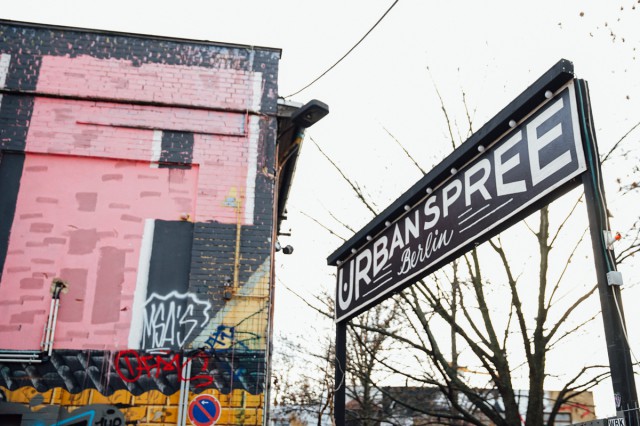Nicolas Defawe
After our interviews with Berlin city shapers PANSY from Yo! Sissy Festival and Yasha Young from Urban Nation we are coming to the third and final part of our interview series that is inspired by Heineken’s Shape Your City campaign. While the winners of The Cities Project are already working to make their bar concept a reality in the beautiful city of Cologne, we had a chat here in Berlin with our latest interview partner Nicolas Defawe. If his name doesn’t ring a bell for you, you might know some of the amazing spaces that he was and is involved in such as the awesome, but sadly closed HBC, the short-lived +-0 in the old Postbahnhof building, and the Urban Spree gallery at the RAW area.
Nico is one of the people in the alternative cultural scene of Berlin that we have collaborated with a lot over the years with many of the events we did with iHeartBerlin and its sister project Designer Scouts. It was always such a pleasure to work with him because he has such a positive and supportive spirit and he is the type of guy that you can easily go and steal horses with (this is a funny expression we like to use in German that means that someone is game with just about anything). In our interview with him and his Urban Spree partner Pascal Feucher we revisited some of the old places and looked into the future for the current one…
HBC in 2008, photo: iHeartBerlin
Nico, we’ve met the first time when you did the programming at a dearly missed cultural venue called HBC (tear in my eye). How did you get involved in this project and what was the plan with this crazy place?
Nicolas Defawe: Hahaha, no tears for me, I just felt relieved! This place was like a big sinking boat after a while! After the first opening of the HBC (a big group show and a party in the raw space), Lucy Lux (Max Dax’s wife) asked me if I wanted to take care of the next party because she knew that I used to do that back in Paris. I was truly amazed by the place, so I didn’t have to think so much to accept her offer.
However, nothing was very clear as far as the plans for this place were concerned. HBC was barely legal. Many people were involved and the project was in constant development. Some creative minds, like Lucy Lux, Stephan Rothfuß, Nomad and many others, were in the middle of an intense creative process aiming to turn this place to what it used to be – that was probably the best time for HBC.
We had the opportunity to have a proper contract to keep the space afloat, which is why we decided to build a new bar and a club in the Kino room. Afterwards, most of the changes were about to come. For example, we opened the restaurant, because we were targeted by the authorities due to the club; so we had to make another investment in order to continue to generate revenues. A kind of a vicious circle!
But the main idea was always to create an amalgamation of genres defying any frontiers that were separating them until then: contemporary art, queer party, classical music, fancy restaurant… HBC was the perfect place to mix all that!
HBC in 2009, photo: iHeartBerlin
In the landscape of Berlin there have always been these re-purposed kinds of places that serve as temporary “urban grow houses” for creative ideas and artistic expressions. It’s like the counter culture of publicly funded cultural places such as theaters and concert houses. In the end it was the more alternative projects that brought Berlin to international fame. From your perspective now, what is the balance of these two “worlds” and how will it be in the future?
ND: This is a very important issue! One of the goals of my new project, Urban Spree, is to create connections with other European spaces. We organized two exciting events this summer in Paris and Brussels which gave the opportunity to see how it works somewhere else; given this experience I realized that Berlin is pretty far behind compared to other cites! In Paris many alternative projects are now supported by the city just by doing some simple processes to work together. The city is definitely aware of the amazing input provided by this kind of projects and the benefits they yield. There is a real relationship between those two worlds and I am not sure that Berlin is ready for that at the moment. In Brussels, it is even more efficient, there is very intense legal frame to organize the relationship among artists, society, social projects, the city, and private owners. There are so many great projects that are implemented under wonderful circumstances.
Berlin has now an incredible hub of creative people and I have the feeling that nothing is done to take advantage of that properly. In my opinion, it is a major challenge to Berlin’s cultural future and a substantial cause for a political fight!
HBC in 2010, photo: iHeartBerlin
In the projects that I know you were involved in it was always about a mix of showing art and nightlife. Is that not like using art as an excuse to party? Or is showing art while having a party the same as showing it in a regular gallery?
ND: I have a different point of view: a gallery without party could be a bit boring and a party without art is definitely boring! More specifically, there are two main aspects: first, there is a powerful connection between art and nightlife in Berlin, that it makes it irresistible not to try to combine them! It is also a financial issue: if you are not a culturally founded space – like us – you will most certainly need additional revenues generated by parties in order to run a decent program. It is more or less what we do at Urban Spree; the club and the beer garden help us a produce the art show, run a residency program etc.
Urban Spree, 2016, photo: Alicia Kassebohm
Here’s a question for both of you, Nico and Pascal: A few years ago you opened Urban Spree, yet another project with multiple facets. How would you explain what it was and what it has become now?
Pascal Feucher: Back in 2012, this part of the RAW was unoccupied and fenced off. In the past, the buildings hosted training facilities for the train drivers and engineers, juxtaposing a 19th century brick warehouse to a stout, east German concrete building back from the 1970s. There were occasional rave parties, inside was squatted too. It was full of graffiti, there were remains of rehearsal and recording studios. I think it had been empty for 5 years. It was, however, in good condition and the perfect location to start something alternative.
The idea was to use the space to create grassroots street art, where the location is used in context, in situ, no harsh redevelopment, but an understanding of the place, its location and the history behind it instead. Revamping the site, but keeping the dirty feeling at the same time. All this by being totally independent, without any branding. Bring in culture. The space grows organically at its own pace. It’s never finished and will never be as we’re adding new bricks every year, however we feel like. The space is alive, mobile, mutant. We can probably say that’s it’s a transition space between what was before (a more underground, techno-oriented cultural offer in the RAW) and what’s now (well-funded leisure spaces to cater a more affluent population). That reflects the fast-paced sociological change in the neighborhood. But we keep what we do consistent since the beginning. We have a bookstore, because we love books not because it brings money.

Urban Spree in 10/2014, photo: Yuto Yamada
The RAW area that Urban Spree is located on is going to change due to construction plans of the new owner of the land. Is Urban Spree going to be able to survive the changes and how is the plan to make it co-exist with the new, more commercial side of Berlin that’s becoming more prominent in the city?
PF: Seen from today’s point of view the development plans for the RAW area include the tearing down of Urban Spree. There would be commercial real estate (offices, supermarkets, parking lots etc…), like a natural extension of what is already happening in a larger scale around the East Side Gallery. Those redundant commercial projects are metastasizing in Friedrichshain. Berlin is steadily becoming a standardized city with standardized needs. For us, keeping the buildings is important, because they play a vital role in keeping the memory of the district alive. Doing what we do in sanitized buildings is irrelevant. We will, however, adapt to the new situation!
Urban Spree in 10/2014, photo: Yuto Yamada
Nico, you once told me you had plans to leave Berlin and live on an island and you didn’t mean that as a joke. Yet you are still here. Did Berlin not let you go?
ND: It was not a joke! I wanted to grow oysters in my mum’s island, but after a couple of months, I realized that my wife and my kids were not so enthusiastic about this idea. Perhaps I will try again in a couple of years! I still love Berlin, but to be honest, it is probably more of a convenience than a real passion by now. To use a cliche, Berlin is not Berlin any more!
Did you or do you do any other venues or projects before/after/between these three that we should know of?
ND: There is a couple of other projects, a festival about Berlin in Lille with a crazy pops up restaurant with Unit Berlin, which are my favorite architects in town; a natural wine bar with Maxim Boillat (chez Maxim) and a few others projects… We are working now with my wife Alexia on a new big project: connecting European cities through rivers and canals… On a very big boat, my dream!
Thank you for your time to speak with us!
Urban Spree in 10/2014, photo: Yuto Yamada
* * *
I wonder what experiences Luisa and Rike, winners of the Shape Your City competition, will make over the next few weeks once the bar in Cologne opens soon. Stay up-to-date with the process over here.
Thanks for the support by Heineken







